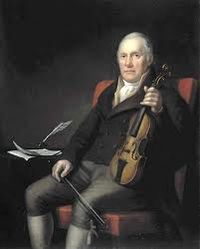Annotation:Miss Farquharson of Invercauld's Strathspey (1): Difference between revisions
No edit summary |
m (Text replacement - "garamond, serif" to "sans-serif") |
||
| Line 1: | Line 1: | ||
=='''Back to [[{{BASEPAGENAME}}]]'''== | =='''Back to [[{{BASEPAGENAME}}]]'''== | ||
---- | ---- | ||
<p><font face=" | <p><font face="sans-serif" size="4"> | ||
'''MISS FARQUHARSON OF INVERCAULD’S STRATHSPEY [1]'''. AKA and see "[[Lady Louisa Gordon]]," "[[Miss McLeod's Fancy]]." Scottish, Strathspey. F Major. Standard tuning (fiddle). AB (Marshall): AABB (Hunter). Composed by William Marshall (1748-1833), who first called it "[[Lady Louisa Gordon]]." Gow reprinted it, without composer credit until the '''Sixth Collection''', as "[[Miss McLeod's Fancy]]," but it finally reappeared in Marshall's posthumously published collection (1845) under his "Miss Farquharson of Invercauld" title. The celebrated stage dancer, Madam Hillsburgh, danced to the melody in the early 19th century. | '''MISS FARQUHARSON OF INVERCAULD’S STRATHSPEY [1]'''. AKA and see "[[Lady Louisa Gordon]]," "[[Miss McLeod's Fancy]]." Scottish, Strathspey. F Major. Standard tuning (fiddle). AB (Marshall): AABB (Hunter). Composed by William Marshall (1748-1833), who first called it "[[Lady Louisa Gordon]]." Gow reprinted it, without composer credit until the '''Sixth Collection''', as "[[Miss McLeod's Fancy]]," but it finally reappeared in Marshall's posthumously published collection (1845) under his "Miss Farquharson of Invercauld" title. The celebrated stage dancer, Madam Hillsburgh, danced to the melody in the early 19th century. | ||
[[File:marshall.jpg|200px|thumb|left|William Marshall]] | [[File:marshall.jpg|200px|thumb|left|William Marshall]] | ||
| Line 10: | Line 10: | ||
<br> | <br> | ||
</font></p> | </font></p> | ||
<p><font face=" | <p><font face="sans-serif" size="4"> | ||
''Source for notated version'': | ''Source for notated version'': | ||
<br> | <br> | ||
<br> | <br> | ||
</font></p> | </font></p> | ||
<p><font face=" | <p><font face="sans-serif" size="4"> | ||
''Printed sources'': Hunter ('''Fiddle Music of Scotland'''), 1988; No. 162. Marshall, Fiddlecase Edition, 1978; '''1845 Collection''', p. 6. Petrie ('''Second Collection of Strathspey Reels and Country Dances'''), 1796; p. 7. | ''Printed sources'': Hunter ('''Fiddle Music of Scotland'''), 1988; No. 162. Marshall, Fiddlecase Edition, 1978; '''1845 Collection''', p. 6. Petrie ('''Second Collection of Strathspey Reels and Country Dances'''), 1796; p. 7. | ||
<br> | <br> | ||
<br> | <br> | ||
</font></p> | </font></p> | ||
<p><font face=" | <p><font face="sans-serif" size="4"> | ||
''Recorded sources'': <font color=teal></font> | ''Recorded sources'': <font color=teal></font> | ||
</font></p> | </font></p> | ||
Revision as of 14:22, 6 May 2019
Back to Miss Farquharson of Invercauld's Strathspey (1)
MISS FARQUHARSON OF INVERCAULD’S STRATHSPEY [1]. AKA and see "Lady Louisa Gordon," "Miss McLeod's Fancy." Scottish, Strathspey. F Major. Standard tuning (fiddle). AB (Marshall): AABB (Hunter). Composed by William Marshall (1748-1833), who first called it "Lady Louisa Gordon." Gow reprinted it, without composer credit until the Sixth Collection, as "Miss McLeod's Fancy," but it finally reappeared in Marshall's posthumously published collection (1845) under his "Miss Farquharson of Invercauld" title. The celebrated stage dancer, Madam Hillsburgh, danced to the melody in the early 19th century.

Miss Farquharson was a daughter of Archibald Farquharson, a Whig politician who represented Seafield and Kintore in the general election of 1829, records Moyra Cowie, in her book The Life and Times of William Marshall (1999). The Farquharson’s acquired their estate from the Gordons in 1749, and the family still owns Braemar Castle.
Source for notated version:
Printed sources: Hunter (Fiddle Music of Scotland), 1988; No. 162. Marshall, Fiddlecase Edition, 1978; 1845 Collection, p. 6. Petrie (Second Collection of Strathspey Reels and Country Dances), 1796; p. 7.
Recorded sources:
